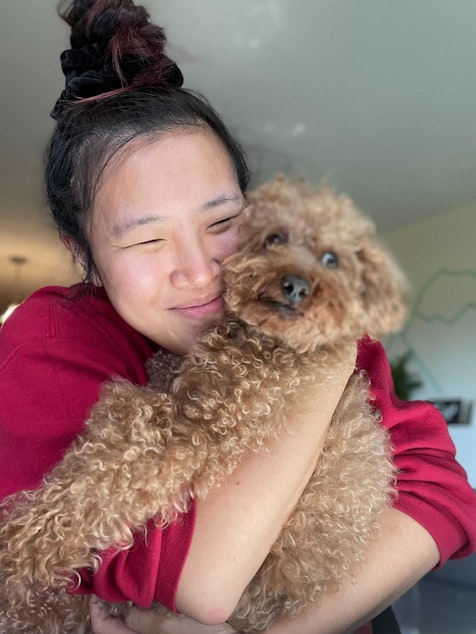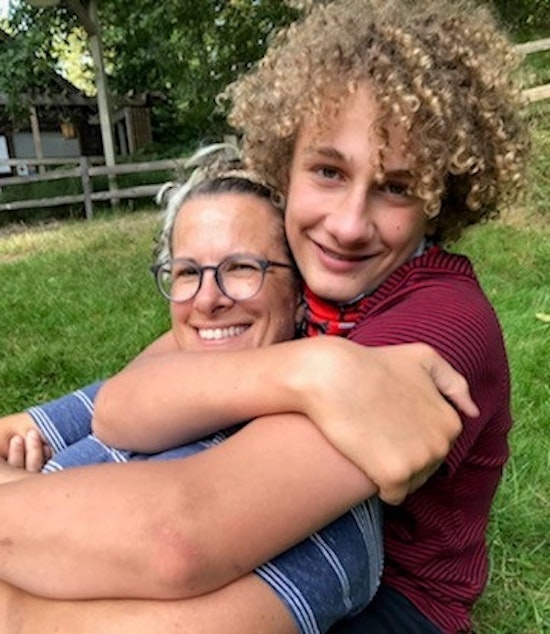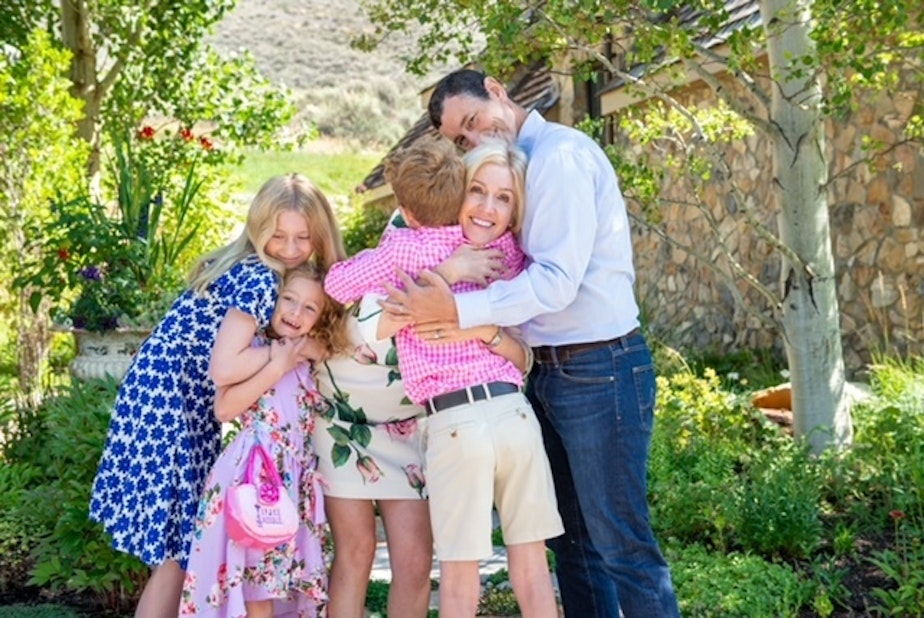Seattle Now: Hugs in the time of Delta
Vaccines have made it a lot safer to be physically close to people again, but that's prompting all sorts of conversations about peoples' comfort level with physical touch.
Do you go in for a hug, or keep your distance?
KUOW surveyed random people on the street about their thoughts on hugs, especially as the delta variant causes Covid cases to surge in Washington.
- "I don't know. I'm not much of a hugger."
- "I'm a hugger. It depends on the person."
- "First time I saw them when they came to town, I'd give them a hug. But I might not give them a hug until they left again."
- "I didn't necessarily grow up with hugs, but I want to have hugs as part of my daughter's life."
In this episode of Seattle Now, host Patricia Murphy talks with University of Washington psychology professor Nicole McNichols, and Seattle-based poet Shin Yu Pai about the benefits and cultural complexities of physically connecting with others during this pandemic and beyond.
The transcript below has been edited for clarity
Sponsored
PATRICIA MURPHY: Are you a hugger?
NICHOLE McNICHOLS: I am a huge hugger. Yes, absolutely. I've got three children and a husband who I hug all the time. I like to bring it in a lot.
PATRICIA MURPHY: You know, I didn't grow up as a hugger. I came to it late in life. And now I realize I take my cues from other people, and more often I just go in for the big hug.
NICOLE McNICHOLS: Absolutely. Well, I think that that's so important, too. Because now with this increased focus on consent, I think that's really an important thing to do. And I always kind of look at someone and say, "Can I hug you?" before I actually go in for the hug.
PATRICIA MURPHY: You know, what's interesting is for 18 months, we were told it was dangerous to be close to each other. And I wonder what kind of impact that had on people. What did that do to us?

NICOLE McNICHOLS: I think that that will have, you know, a lasting impact. Because for a while, you know, we know that touch, for example, human touch is related to all sorts of really important positive health outcomes, ranging from blood pressure to heart disease, to depression, stress, anxiety; it's even been found to negatively correlate with personality disorder symptoms. So in other words, making people who do struggle with severe mental illness, human touch has been found to kind of mitigate those symptoms. So I think that it's been really tough on a lot of people. And I think getting that message that it's dangerous to touch others has certainly taken its toll as well.
PATRICIA MURPHY: We are still in the middle of a pandemic here. Even though things have opened up just a little bit with vaccines. The delta variant is really, really messing with our ability to recover and to make it through this virus. Hugging again is a bit of a risk and everyone is in a different place. I wonder if we're in this, are we going to hug moment with each other?
NICOLE McNICHOLS: Yeah. And I think that that is really going to come down to kind of the individual cost-benefit analysis that each individual does, right? It's not that I'm not terrified of the delta variant, it's out there. It's something to, certainly be worried about. But I think what has to go into this calculus is just how fundamentally important human touch is to our mental well-being. And even to physical health outcomes that seem like they have nothing to deal with mental health. So I think that that's kind of part of the equation.
Sponsored
Now, for somebody who's not vaccinated, maybe can't get vaccinated, or if you don't know if someone's vaccinated, I expect that we'll continue to exercise maybe a little bit of constraint or just sort of think about it. But I do hope that if people feel safe, if they are vaccinated, if they know others are vaccinated, that they will make a conscious effort and be intentional about trying to introduce touch back into their life because I do think it's incredibly important.

PATRICA MURPHY: And we talked a little bit about this earlier — me giving my open armed cue about offering a hug, versus just taking a hug because there is a pretty new conversation about consent.
NICOLE McNICHOLS: Absolutely. You know, as I tell my students, sometimes this new conversation about consent doesn't go over so well with grandma and grandpa who come in and want their hug. And if you're trying to teach your children that — and especially from a very early age, it's so important to teach children that they have sort of a right to their own personal boundaries — they have a right to their own personal body sphere. Nobody should feel the right to come in and essentially violate that unless they have express permission of the child. Sometimes this means explaining to grandma or grandpa: "You can't just go up and hug your grandchild. You need to, you know, do the open arm thing where you try to gauge how interested they are." First, I think that for every age, though, this idea of consent is just so important to respect that acknowledge and understand and introduces this idea of "OK, well, I have to make sure I'm going about this in a way that respects people's boundaries."
PATRICIA MURPHY: So obviously, we spent the better part of a year being wary of touching each other. In some cases, it's dangerous. How has that changed our conversation around consent when it comes to hugging?
NICOLE McNICHOLS: I think it's really strengthened that conversation, I think that you have to take into account that it's not just your health and safety that is being called into question. Maybe when you go and hug somebody, you have to think about that person's safety level, I think we almost have to double down on our efforts to clarify that somebody is actually happy about the idea of being hugged.
PATRICIA MURPHY: Yeah. And like you said, vaccination status really factors into that these days?
NICOLE McNICHOLS: It sure does. And just remember, just because somebody says that they're vaccinated, (it) doesn't mean that you can just go in for the hug and not ask them. Even if it's for just personal reasons, that they just still feel frightened, you have to respect that. It's just so important to allow there to be consent and encourage people to voice whatever their personal boundaries are.
PATRICIA MURPHY: And of course, if they're not vaccinated, that is an entirely different conversation.
NICOLE McNICHOLS: Yes, it sure is. It sure is. And again, then it's up to you. But I would not be surprised if many people feel less inclined to go in for a hug with a person who's not vaccinated.
The anti-huggers

Of course, there are a lot of people who are extremely glad nobody is expected to hug anyone anymore. Some people weren't big huggers even before the pandemic. We spoke to a Pacific Northwest-based poet, Shin Yu Pai. She's Taiwanese American, and she's not super comfortable with hugs right off the bat.
SHIN YU PAI: You know, I think it depends on this kind of level of intimacy, or knowing someone. I just don't feel comfortable hugging some people. I don't think it makes me frigid, or unaffectionate, or cold in that kind of, I don't know, stereotypical way that people tend to perceive Asian Americans. It's just, I don't want to hug everybody. I think it's okay to say that.
Socially acceptable
Back to our conversation with Professor McNichols.
PATRICIA MURPHY: I wonder if the pandemic could make it more accepted that people don't want to touch?
NICOLE McNICHOLS: I think it's definitely going to make it totally more socially acceptable to not want to touch to not want to hug. Also, one thing that I'm going to admit that I'm a little grateful about is that it's not going to be assumed that you're going to go shake somebody's hand. Because that does make me personally feel a little bit more at risk. Just because you cough, you cover your mouth with your hand, it just seems like a really easy way to pass germs. So I might keep that the elbow bump.
PATRICIA MURPHY: You know, it's gonna be interesting to see where we all land as a culture on this because everything has changed. We are different people on the other side of this pandemic and we're not even on the other side of it yet. So to be determined, where we end up. I am curious if there are people who feel like they do need more touch, but are not really into the giant hugging thing. Where is that middle of the road for them?
NICOLE McNICHOLS: So there has been a lot of research on that too. One of the things that's shown really positive benefits is massage. And it doesn't have to be somebody who is even necessarily a physical therapist, but just any kind of massage that you might go in for if you're into things like manicures or pedicures, or facials if that's your thing—that can offer types of touch. Even a haircut. I think this is why we confess all of our deepest darkest secrets to our hairdressers. There's something — seriously, my hairdresser knows so much about me. I mean, there are major opportunities for blackmail there — but I think that it's it is it's very intimate, even if it's not somebody who you see every day in your life. And there are things like weighted blankets now that can offer that cocoon feeling. And there's a lot of research with pets. So having a dog or a cat that you snuggle up with; those things can also introduce elements of touch or something that simulates the effects of touch that can really help a lot of people.

PATRICIA MURPHY: Yeah, fascinating. There's so much vulnerability when we touch each other.
NICOLE McNICHOLS: Yes, I think there really is. And, you know, I think it's interesting because it's not just that we vary as individuals in terms of how much we want touch, but I find I even very day-to-day, or even hour-by-hour. You know, sometimes I'm in the mood to touch and I'm in the mood for a hug. And sometimes I just kind of want my quiet time and maybe I'm in work mode or just having that kind of a day where I don't want touch. We're allowed to have variability and we're allowed to sort of allow ourselves to change.
PATRICIA MURPHY: Yeah, fascinating conversation. You know, even maybe reaching out and just tapping someone on the arm to say, "Hey, I'm here and I hear you" is enough sometimes
NICOLE McNICHOLS: It really is. And also, there's a really interesting study where they found that if you make a request of someone, and then gently kind of tap them on the elbow, kind of like a soft embrace, that that person is more likely to go along with your request, than if you don't. Right? So there's your tip of the day!
Follow Nicole on Instagram @Nicole_TheSexProfessor, and learn more about Shin Yu at ShinYuPai.com.
This episode of Seattle Now was produced by Sonya Sheptunov with editing support from Clare McGrane. Patricia Murphy was our conversation host, with Paige Browning introducing the episode.
Want more Seattle Now? Follow us on Instagram @seattlenowpod.
Are you looking forward to a return to hugging? Has the pandemic been a relief for you because you were never much of a hugger in the first place? Send us a message at seattlenow@kuow.org, or just head over to the side of this page and click the feedback button. We're listening.





